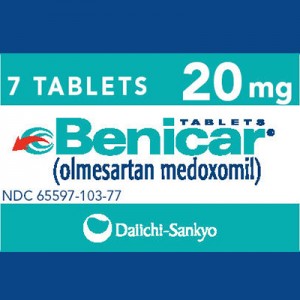Study Raises Concerns About Benicar Risks
 Researchers from Taiwan recently released a study in the medical journal Cardiovascular Diabetology that warns patients of the potential for serious Benicar side effects. The researchers evaluated information from approximately half a million patients from January 2004 to December 2009.
Researchers from Taiwan recently released a study in the medical journal Cardiovascular Diabetology that warns patients of the potential for serious Benicar side effects. The researchers evaluated information from approximately half a million patients from January 2004 to December 2009.
The patients all used angiotensin receptor blockers (ARBs), a type of antihypertensive drug prescribed to treat high blood pressure. Benicar is a type of ARB. Out of those patients, over 65,000 developed diabetes.
The researchers determined that Benicar could increase the risk of diabetes by six to seven percent, which is particularly significant considering that other ARBs not only do not increase the risk of diabetes, but that they actually lower the risk by 15 to 25 percent.
FDA issued warning for other Benicar problems
This study adds fuel to the growing concern about Benicar side effects. Since Benicar was approved by the FDA in 2002, evidence is mounting with regard to its causal role in a number of medical conditions. The FDA released a drug safety announcement to patients and healthcare providers that stated Benicar was linked to sprue-like enteropathy.
Sprue-like enteropathy refers to a collection of gastrointestinal problems, including severe, chronic diarrhea, significant weight loss, and other side effects that often require hospitalization. The FDA has warned that sprue-like enteropathy may occur months or even years after beginning treatment with Benicar. Patients who develop these symptoms and discontinue Benicar under the guidance of their healthcare providers typically see the resolution of their symptoms. Sprue-like enteropathy is not known to occur with any other type of ARB.
The potential side effects of Benicar are raising concerns among experts who have been monitoring trends in celiac disease prevalence. Celiac disease refers to the body’s immune reaction to the consumption of gluten, a protein found in barley, rye, and wheat. The reaction in the small intestine produces a wide range of symptoms, including severe diarrhea, weight loss, bloating, and other gastrointestinal problems that can mimic sprue-like enteropathy caused by Benicar. The medical problems associated with Benicar may cause some patients to be needlessly tested for celiac disease, which requires blood tests and an invasive colonoscopy, or to start a gluten-free diet of their own accord.
Like celiac disease, it is believed that Benicar can cause long-term damage to the gastrointestinal tract. The intestines may suffer from villous atrophy, which is the deterioration of the villi. The villi are very tiny tentacle-like structures on the lining of the small intestine. They serve an important function in the body, enabling the absorption of nutrients from food. It is believed that with long-term exposure to Benicar, as with untreated celiac disease, the villi can become completely eroded. This prevents the absorption of nutrients and will lead to malnutrition, a weakened immune system, electrolyte imbalances, and other medical problems associated with malnutrition.
Manufacturer faces growing number of lawsuits
The manufacturers of Benicar, Daiichi Sankyo and Forest Laboratories, have already been notified of the first few lawsuits filed with regard to alleged Benicar complications. The plaintiffs filed their complaints in a New Jersey state court in February 2014. The plaintiffs claimed that Benicar caused their gastrointestinal problems and that the manufacturer did not warn them of these risks. Legal experts anticipate additional Benicar lawsuits to quickly follow on their heels.
- FDA, FDA Drug Safety Communication: FDA approves label changes to include intestinal problems (sprue-like enteropathy) linked to blood pressure medicine olmesartan medoxomil, http://www.fda.gov/drugs/drugsafety/ucm359477.htm
- Cardiovascular Diabetology, Different angiotensin receptor blockers and incidence of diabetes: a nationwide population-based cohort study, http://www.cardiab.com/content/13/1/91


 Resources
Resources
 Resources
Resources
